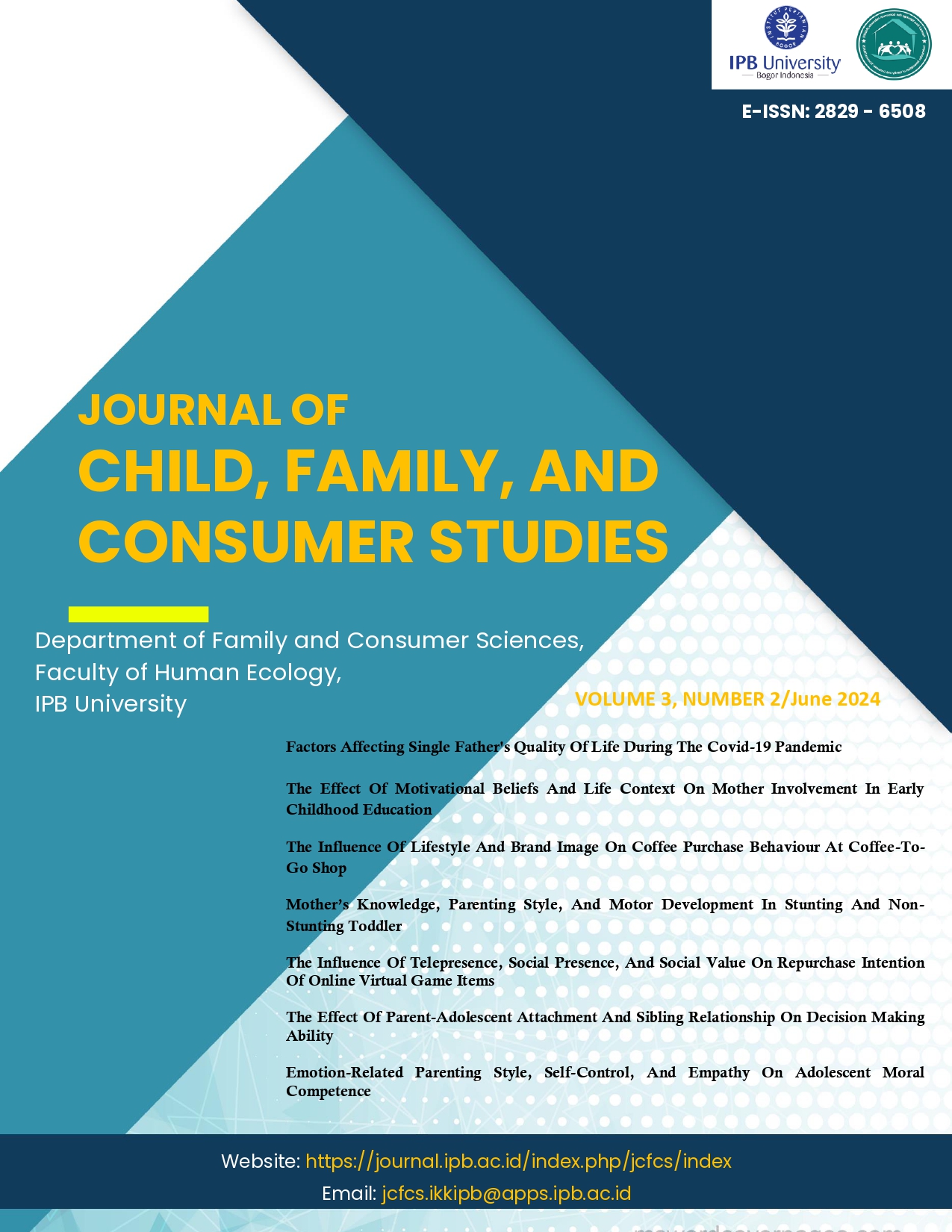EMOTION-RELATED PARENTING STYLES, SELF-CONTROL, AND EMPHATY ON ADOLESCENTS’ MORAL COMPETENCE
Abstract
The rapid pace of modern life poses a significant challenge for adolescents as they navigate the complexities of moral development and fulfill their developmental obligations. Several factors, including parental influences and adolescent characteristics, play a crucial role in shaping their moral development. This study examined the impact of family dynamics, adolescent characteristics, emotion-related parenting styles, self-control, and empathy on adolescent moral competence. Conducted in the Bandung City area, the study employed an explanatory research design and utilized a quantitative survey method with a sample of 110 pairs of high school students aged 15-18 and their parents. Results revealed that girls exhibited higher levels of empathy than boys and that self-control tended to decrease with grade level. Additionally, parents with a college education were more likely to employ emotion-coaching strategies. While there was no significant correlation between emotion-related parenting styles and adolescent moral competence, self-control and empathy demonstrated a positive and influential relationship with moral development in adolescents.
References
Christov-Moore, L., Simpson, E. A., Coudé, G., Grigaitye, K., Lacoboni, M., Ferrari, P. F. (2014). Empathy: gender effect in brain and behavior. Neurosci Biobehav Rev, 46(4), 604–627. https://doi.org/10.1016/j.neubiorev.2014.09.001.
Dautov, D. (2020). Procrastination and laziness rates among students with different academic performance as an organizational problem. E3S Web of Conferences, 210(2), 1–10. https://doi.org/10.1051/e3sconf/202021018078.
Georgoulas-Sherry, V. (2022). The impact of expressive flexibility and self-control on moral competence following exposure to simulated combat-like environments in 18-22-year-old U.S. military recruits. International Journal of Research in Counseling and Education, 6(1), 60–68. https://doi.org/10.24036/00508za0002.
Goleman, D. (1996). Emotional Intelligence. Bloomsbury Publishing.
Gottman, J. M., Declaire, J. (1997). Raising an Emotionally Intelligent Child. Simon & Schuster.
Guo, W. (2020). Grade-level differences in teacher feedback and students’ self-regulated learning. Frontiers in Psychology, 11(783), 1–17. https://doi.org/10.3389/fpsyg.2020.00783.
Hidayah, N. R. (2020). Kontrol diri dan konformitas terhadap kenakalan remaja. Psikoborneo: Jurnal Ilmiah Psikologi, 8(4), 657–670. https://doi.org/10.30872/psikoborneo.
Hidayah, R. (2021). Students’ self-adjustment, self-control, and morality. Journal of Studies Education Research, 12(1), 174–193. https://jsser.org/index.php/jsser/article/view/3075.
Kementerian Kesehatan RI. (2017). Inilah risiko hamil di usia remaja. https://sehatnegeriku.kemkes.go.id/baca/umum/20170930/5823163/inilah-risiko-hamil-usia-remaja/.
Lee, I., Coniam, D. (2013). Introducing assessment for learning for EFL writing in an assessment of learning examination-driven system in Hong Kong. Journal of Second Language Writing., 22(1), 34–50. https://doi.org/10.1016/j.jslw.2012.11.003
Ma, H. K. (2012). Moral competence as a positive youth development construct: a conceptual review. The Scientific World Journal, 1–8. https://doi.org/10.1100/2012/590163.
Metvirishvili, M., Kvitsiani, M., Odilavadze, M., Metvirishvili, N. (2023). Moral competence and self-control: the moderating role of personality traits. Studia Psychologica, 65(1), 3–17. https://doi.org/10.31577/sp.2023.01.863.
Moffitt, T. E, Arseneault, L., Belsky, D., Dickson, N., Hancox, R. J., Harrington, H., Houts, R., Poulton, R., Roberts, B. W., Ross, S., et al. (2011). A gradient of childhood self-control predicts health, wealth, and public safety. PNAS, 108(7), 2693–2698. https://doi.org/10.1073/pnas.1010076108.
Molchanov, S. V. (2014). Empathy as the factor of moral dilemma-solving in adolescence. Procedia – Social and Behavioral Science, 146, 89–93. https://doi.org/10.1016/j.sbspro.2014.08.091.
Ningrum, D. (2015). Kemerosotan moral di kalangan remaja: sebuah penelitian mengenai parenting styles dan pengajaran adab. UNISIA, 37(82), 18-30. https://doi.org/10.20885/unisia.vol.37.iss82.art3.
Overgaauw, S., Rieffe, C., Broekhof, E., Crone, E. A., Guroglu, B. (2017). Assessing empathy across childhood and adolescence: validation of the empathy questionnaire for children and adolescents (EmQue-CA). Frontiers in Psychology, 8(870), 1–9. https://doi.org/10.3389/fpsyg.2017.00870.
Paterson, A. D., Babb, K. A., Camodeca, A., Goodwin, J., Hakim-Larson, J., Voelker, S., Gragg, M. (2012). Emotion-related parenting styles (ERPS): a short form for measuring parental meta-emotion philosophy. Early Education and Development, 23, 583–602. https://doi.org/10.1080/10409289.2011.569316.
Pizarro, D. A., Salovey, P. (2002). Being and becoming a good person: the role of emotional intelligence in moral development and behavior. Dalam Aronson J, Improving Academic Achievement: Impact of Psychological Factors on Education, hlm. 247-266. Emerald Publishing Limited.
Rose, J., McGuire-Snieckus, R., Gilbert, L. (2015). Emotion coaching – a strategy for promoting behavioural self-regulation in children/young people in school: a pilot study. The European Journal of Social and Behavioural Sciences, 13(2), 130–157. https://doi.org/10.15405/ejsbs.159.
Santrock, J. W. (2011). Life-Span Development: Perkembangan Masa-Hidup. Erlangga.
Tangney, J. P., Baumeister, R. F., Boone, A. L. (2004). High self-control predicts good adjustment, less pathology, better grades, and interpersonal success. Journal of Personality, 72(2), 271–322. https://doi.org/10.1111/j.0022-3506.2004.00263.x.
Winurini, S. (2016). Telaah kecerdasan moral remaja melalui moral competency inventory (studi pada pelajar di Bali). Aspirasi, 7(2), 187–197. https://doi.org/10.46807/aspirasi.v7i2.1289.
Wu, Y., Chen, X., Qu, J. (2021). Self-control, morality, and criminogenic exposure. Criminal Justice and Behavior, 49(4), 1–23. https://doi.org/10.1177/00938548211034840.
Yanti, Y., Hamidah, H., Wiwita, W. (2019). Analisis faktor penyebab dan dampak pernikahan dini di Kecamatan Kandis Kabupaten Siak. Jurnal Ibu dan Anak, 6(2), 96–103. https://doi.org/10.36929/jia.v6i2.94.
Yolanda, C., Fatmariza, F. (2019). Pergeseran nilai-nilai moral masyarakat dan implikasinya terhadap moralitas remaja di Kecamatan IV Nagari Bayang Utara Kabupaten Pesisir Selatan. Journal of Civic Education, 2(2), 182–189. https://doi.org/10.24036/jce.v2i3.152.










